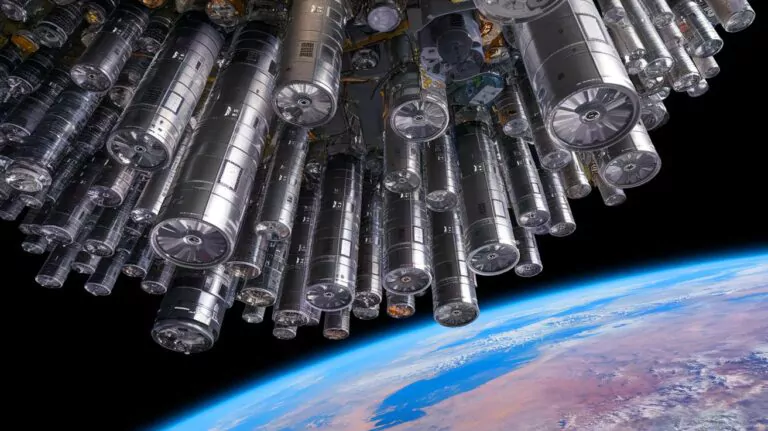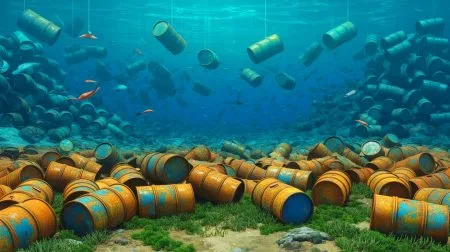| IN A NUTSHELL |
|
In recent years, China’s ambitious plans to launch satellite megaconstellations have sparked widespread concern among space experts and environmentalists. With the introduction of the Guowang and Qianfan constellations, China aims to deploy thousands of satellites into orbit, potentially cluttering space with debris that could have long-lasting consequences. As these projects unfold, the global community is left to grapple with the implications of increased space congestion and the risk of collisions that could last for generations.
China’s Rocket Problem
China’s space endeavors have not been without controversy. The nation’s space administration has faced scrutiny for its handling of rocket launches, particularly regarding the disposal of rocket stages. In 2022, several launches for the Tiangong space station resulted in uncontrolled rocket reentries, causing alarm when one incident forced Spain to close its northern airspace. Controlled reentries, which require additional fuel and resources, ensure safety by preventing debris from causing harm on the ground.
However, China’s current practice involves leaving spent rocket boosters in low Earth orbit, where they can remain for over a hundred years. According to Jim Shell, a consultant specializing in orbital debris, China plans over 1,000 launches to deploy its constellations, each leaving behind rocket stages in persistent orbits. If unaddressed, this could lead to a significant increase in orbital debris, heightening the risk of collisions in space.
China’s Satellites and Rockets Are Adding to Congestion in Orbit
The deployment of China’s Guowang and Qianfan constellations is further contributing to the congestion in low Earth orbit. The Long March 6A and 8 rockets used for these launches are leaving their upper stages at altitudes between 447 and 484 miles, far above the recommended global threshold. This results in less atmospheric drag, allowing debris to persist for decades. The Guowang and Qianfan satellites orbit even higher, at approximately 621 miles above Earth.
Although newer rocket models, such as the Yuanzheng-2, have the capability to deorbit themselves, many of the older models responsible for uncontrolled reentries are still in use. As China continues to develop reusable medium-lift rockets, the handling of reentries remains uncertain. With plans to increase production of the Long March 5B and Long March 8 rockets, the potential for increased space debris looms large.
A Lack of Transparency
Transparency has been a recurring issue in China’s space activities. Despite having the Yuanzheng-2 rockets that can perform controlled reentries, it remains unclear if these will be used extensively for the Guowang and Qianfan launches. China’s track record of disregarding best practices has been a point of contention. In 2022, former NASA Administrator Bill Nelson criticized China for not sharing trajectory information during an uncontrolled rocket reentry, emphasizing the importance of international cooperation in space safety.
Chinese officials have often dismissed criticism as anti-China propaganda. However, experts like Harvard astronomer Jonathan McDowell have highlighted the issues with China’s reentry practices, calling them objectively worse than those of other countries. The need for greater transparency and adherence to international standards is crucial to mitigate the risks posed by space debris.
The Global Space Debris Problem
China is not alone in contributing to the growing problem of space debris. SpaceX’s Starlink constellation has also faced criticism for its impact on scientific observations and the potential for Kessler Syndrome—a scenario where collisions in space create a cascade of further collisions. With over 6,700 Starlink satellites in orbit and plans to launch many more, the risk of space congestion and debris accumulation is a global concern.
SpaceX’s Falcon 9 rockets perform controlled reentries, but the sheer number of satellites still poses challenges for astronomers and the global scientific community. Reflective surfaces on Starlink satellites obstruct observations by ground-based telescopes, complicating astronomical research. As more nations and companies pursue satellite megaconstellations, the need for coordinated efforts to address space debris and ensure sustainable space exploration becomes increasingly urgent.
As we navigate the era of satellite megaconstellations, the question remains: how can the global community effectively manage space debris and ensure the long-term sustainability of our orbital environment?
Did you like it? 4.4/5 (30)








This article highlights an important issue. Thanks for raising awareness!
Why isn’t there a global treaty for managing space debris yet?
They couldn’t even stop any war amd genocide. what treaty are you looking for. This is just another day in the office my friend.
China’s space ambitions are impressive, but they need to be more responsible.
They calculate all their moves juxtaposed to ours in subversive ways to hinder our success while expanding theirs.
The Long March rockets sound like they could use a safety upgrade.
How does this compare to the Starlink situation?
Anything China do they usé stolen USA technology & take short cuts then leave the mess for the 🌎 world to clean up The USA will have to put China in there place sooner or later.& you better hope the Democrats Don’t take over cause they will sale the country out like they have the last 40 years.
You’ve been reading too much MAGAzine! Get a life.
Ok Xi
Wow ! Ouch !
That is why China is so far ahead ;-)
Do some research, read the Strategic Policy Institute reports, read about advanced materials research and development.
The uk ( where I am, not china) has dropped out of the top 5 in eight categories in the last year ! Our decline is accelerating just like the US has.
20 years ago China led in only three categories but now it’s 57 out of 64 they lead in.
By all means stick your head in the sand, it won’t change the data.
General slayer your a idiot lol the united states cant do shit to china sorry to burst your bubble of “american exceptionalism” but recent events is showing america is to lost in the sauce to do anything these days lol.
Space exploration is risky, but the benefits are enormous. We need balance.
What are other countries doing about this space junk problem?
It’s concerning that China doesn’t seem to care about transparency.
Maybe it’s time for everyone to clean up their own space mess. 🧹🛰️
Can technology solve the debris problem before it gets out of hand?
Another reason to stick with terrestrial internet, I guess. 😅
This is a ticking time bomb if not addressed soon.
Is there any international body that regulates space traffic?
China’s lack of cooperation is worrying. What’s NASA’s stance on this?
Thank you for such an in-depth analysis on a critical issue.
Human greed, human pride, and human ignorance is winning out over treaties, peace, prosperity, etc.
How do scientists track all this space debris?
Could this lead to an international space conflict? 🚀🛰️
China should learn from SpaceX’s controlled reentry practices.
Does this mean future space missions are in jeopardy?
Looks like a space traffic cop is needed! 🚓🛰️
Is it true that space debris can trigger chain reactions? Scary! 🤯
China should be more transparent about its space activities.
Can we really blame one country when everyone contributes to space debris?
Interesting read! Keep up the good work!
Is there any way to clean up existing space debris?
Space is getting crowded, but we need innovation to handle it.
Philippines (Filipinos) must be encapacitated and enabled to unload nukes at Beijing, spacestations and at CCPs doorsteps
The only thing pinoys will unload is their three rate immigrants
Spoken like a true idiot.
It’s ok for the Americans to do it but not China
America’s policy to ban cooperation with China is at fault. Also many instances of its inability to read and understand Chinese leaves it blind as a bat and therefore cry lack of transparency.
Well, since it was made in China, it will be broken in a week and fall to earth.
Reading this. Makes USA In last place everything called progress and ,seems to far to late ,I hope trump is. Our. Guide to prosper and make USA better then dam China.
USA on high alert because China 🤬 Oh wait, did USA provoke China again 🤔
Your kidding me, we’re just worried about space junk. That’s why they’re doing it? Get a f#$@ing grip.
Bullshit. No one cared this issue when starlink happened.
Exactly. It’s like the Alpha wolf crying because a stray dog ate all the meat… when we all well know that wolves were here first, and are much bigger and stronger, so the damn dog couldn’t have eaten all the meat for starters! Lol
The United States needs to set an example first by setting more stringent restrictions to keep that racist South African-wannabe American-monkey from littering the skies with his junk. And he needs to get deported back to where he belongs! Send him back to his continent where his millions could be used for a more dignified cause, like fighting hunger. There are a lot of starving children and diseases over there. We’re tired of his bigotry and his radical political aspirations here! He can take his nonsense back to Africa. We don’t need his money.
See Keesler Syndrome
They calculate all their moves juxtaposed to ours in subversive ways to hinder our success while expanding theirs.
This sounds like more of the usual fear-mongering from the great Musk/Trump duo to further alienate China.
The US has been leaving their garbage in space for decades and no one cares when they do it…
Let’s not underestimate the vastness of space. They’re using sustainability as an excuse, but they’re really upset about the national security issues this raises.
“An artist’s impression of space debris orbiting Earth” 🤣 Clearly just terrible AI art.
Why is this different from starlink? Why is deepseek evil but American ai altruistic? It is a ridiculous proposition, with what’s happening in the world I don’t believe America and it’s oligarchy will look after my best interests. Why can’t I choose? I will be buying a bus and not a Tesla that’s for sure